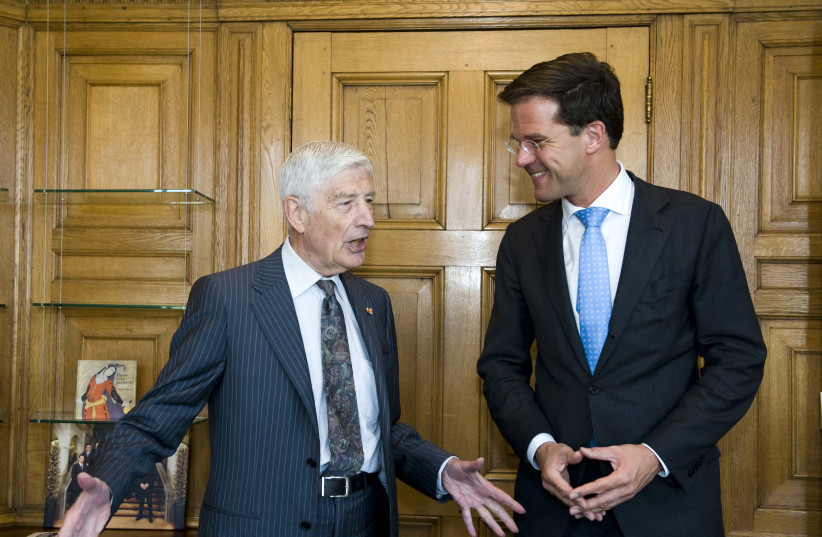Dries Van Agt, who served as prime minister of the Netherlands from 1977 to 1982, and whom Dutch watchdog groups condemned in recent years as an antisemite, chose to die last Monday with the assistance of a doctor, along with his wife. He was 93.
The double-euthanasia was announced on Sunday, by Van Agt’s organization Rights Forum, which he founded to oppose what the group calls “blind support for Israel” in the Netherlands’ public and political discourse.
Euthanasia has been legal in the Netherlands since 2002 for those experiencing “unbearable suffering with no prospect of improvement.”
The recipient’s request must be “made earnestly and with full conviction.” In such a case, a person may request that a physician administer a fatal drug to kill him, usually at home. Euthanasia is distinct from physician-assisted suicide, which refers to the provision, by a medical professional, of a lethal drug to the recipient, who then takes it himself.
Every instance of euthanasia or assisted suicide must be reported to a regional review committee after the fact. If the committee concludes that the doctor did not take due care, he can be imprisoned for up to 12 years.

8,501 euthanasias were performed in the country in 2022
Data from Statista indicates that 8,501 euthanasias were performed in the Netherlands in 2022, as well as 186 physician-assisted suicides, and 33 instances of some combination, altogether making up about 5% of all deaths in the country that year.
The country made headlines in 2023 when it announced it would broaden its criteria to allow doctors to consider the euthanasia requests of children who are terminally ill and for whom palliative care cannot bring relief. The rules would apply to an estimated 5-10 children a year. Minors above the age of 12 are allowed to request euthanasia, and are in very rare cases granted their request, with their parents’ consent.
Sixteen- and seventeen-year-olds "do not need parental consent in principle, but their parents must be involved in the decision-making process," the country's website says.
Van Agt was a fierce critic of Israel, accused of antisemitism
Van Agt made the Israeli-Palestinian conflict a major area of interest later in his life and was condemned on several occasions by Jewish and other organizations as an antisemite. Van Agt defended Hamas as well as individual terrorists several times.
In 2008, the former prime minister spoke at a rally featuring a televised address by a Hamas official. As a justice minister in the 1970s, Van Agt cited his "Aryan" roots in explaining his plan to pardon four Nazi war criminals due to health reasons.
In 2022, the former prime minister said that settlers in the West Bank had poisoned a three-year-old Palestinian girl, a charge that B'Tselem, the leading Israeli organization devoted to documenting alleged human rights violations, said it was not aware of. CIDI, the Netherlands' main antisemitism watchdog, called the accusation a blood libel. The Central Jewish Board of the Netherlands declared Van Agt an antisemite in 2017.
The Rights Forum, which Van Agt founded in 2009, lobbies Dutch politicians and representatives to challenge Israeli policy in the UN and International Criminal Court, alleging “violations of international law and human rights in Israel and Palestine,” and naming international law and human rights as its “explicit and consistent reference framework” as an organization. The group accuses Israel of “violat[ing] the fundamental rights of millions of Palestinians in often extremely violent ways, generation after generation.”
The organization has come under criticism from pro-Israel groups such as NGO Monitor, in particular for a pattern of rejecting allegations or definitions of antisemitism that the group deems politicized: in 2023, the group accused the Dutch ambassador to Israel of “going too far” when he called a shooting attack, in which a 21-year-old resident of East Jerusalem killed seven people and wounded two more, antisemitic.
